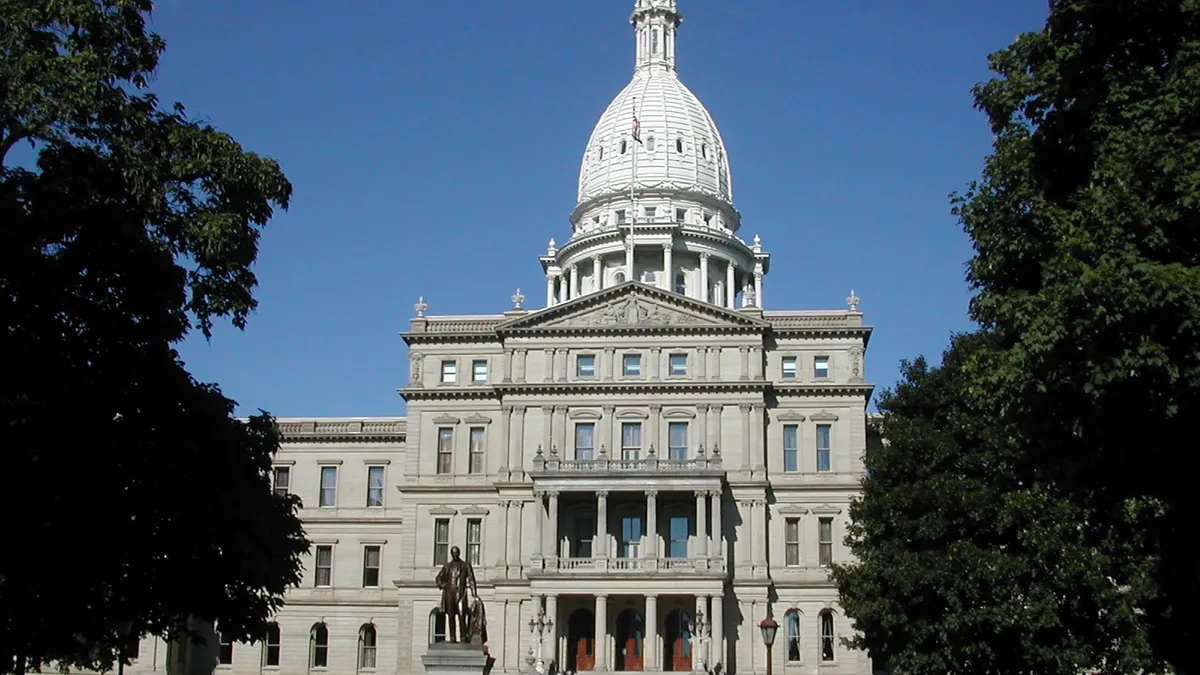Dive Brief:
- A bipartisan group of Michigan lawmakers have proposed expanding the state's net metering program, dropping limits they say are holding back renewable development in favor of policies that are designed to help customers access cleaner energy.
- The bill's sponsors, two Democrats and two Republicans, say their proposal will blend pro-consumer reforms with a market-based approach to ensure customers with distributed resources are fairly compensated.
- The bill package stands as a counter to another piece of legislation which would replace net metering programs with a distributed generation program, under which an electric customer could generate up to 110% of their use.
Dive Insight:
Michigan lawmakers have introduced a package of measures — the Energy Freedom legislation — designed to expand the state's net metering program and give consumers more control over their energy use. And as Michigan Radio points out, the bills are being introduced by a bipartisan group of lawmakers in a state where energy issues often cut along party lines.
“My bill would streamline net metering rules that govern how much energy consumers feed back into the grid, empowering more people in our state to become independent energy producers,” Republican Rep. Ed McBoom said in a statement. “Better net metering rules would especially benefit rural areas and allow farmers the opportunity to realize untapped opportunities for wind, biomass and methane digesters on their land.”
Another bill in the package imagines a program to allow members to buy shares of a renewable energy system and receive a monthly bill credit. While other states have enacted similar policies focusing on solar, the bills' sponsors say this package would allow investment in any renewable energy source.
“As Michigan’s highly successful renewable energy standard expires this year, the Energy Freedom legislation is a bipartisan, bi-peninsular effort to continue shaping our state’s energy future for the better,” said Democratic Rep. Jeff Irwin. “We should be encouraging people to produce clean energy right here in Michigan, not encumbering them with bureaucratic rules."
Michigan currently limits the number and size of net metering projects so customers only generate what they use. The lawmakers said that as renewable energy production grows, the net metering program is expected to reach its limit and shut out new customers within a few years unless the cap is lifted.
The package of bills streamlines the process for businesses, farmers, residents and others to offset their energy cost. Under the current net metering program, the number of participants are capped and lawmakers expect the program will max out within a few years. The proposals would remove that cap and allow more people to participate.
Other proposals would set the fair value pricing for projects up to 500 KW and projects above that threshold. "Fair Value Pricing ensures that homeowners and businesses get paid what utility companies would pay themselves for producing renewable energy," the group of lawmakers said. "The Fair Value Price methodology accounts for the value of the renewable energy, its delivery, generation capacity, transmission capacity, transmission and distribution line losses, environmental value, and other values that are not always considered in current energy prices."
The bill package is seen as a counter to a measure proposed by Republican Sen. John Proos, which many see as favoring utilities. Proos's measure would replace the net metering program with a distributed generation program allowing customers to generate up to 110% of their average annual electricity consumption.














